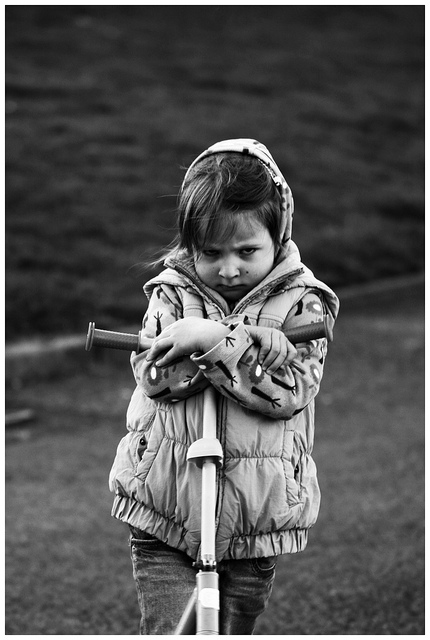Who has the Power?
A child’s job is to push the boundaries that have been set in their environment which is also their ongoing developmental task of figuring out what is socially acceptable while simultaneously working to meet their own personal needs. When you think about it, it’s not really that different from what we as parents are trying to do; to make sure our children’s needs are met.
The power struggle comes into play because the parent and child’s definition of what those needs are is often not the same. And why should it be?
A child may think nothing of having a full-blown temper tantrum over something as simple as wanting a second piece of candy or not wanting to change out of their pajamas. All day there are moments of parent-child interactions that, to the parent may seem unreasonable, but are actually expressions from our children about what they think they need.
Sometimes think they need that second piece of candy so badly that they are willing to let you know as loudly as possible and here is where we meet the temper tantrum. If as parents we are scared of temper tantrums and are willing to do anything to avoid them, including giving in to that request for the second piece of candy at the first sign that a temper tantrum might appear, then we are successfully teaching our child an important lesson:
They can get what they want by having temper tantrums.
Fight or Flight
And although I highly recommend not letting the risk of temper tantrum be the reason to give a child candy, temper tantrums really aren’t as big a problem as many parents might think. In fact believe it or not temper tantrums may at times be something to embrace instead of something to fear.
You see, daily life can be a stressful place. I am sure many of us may have noticed this in our own lives and our children are feeling it too. The human body is wired to go into fight or flight when signs of stress arise and this has been a remarkable survival mechanism for the human race.
But this fight or flight is taxing on the body and the actual stress caused by going into fight or flight needs to be released. Animals do it by shaking their bodies vigorously and getting it all out. Children do it through temper tantrums.
The Best and Worst 30 minutes of Parenting Life
Now I know what you’re thinking—a temper tantrum isn’t going to release stress; it’s actually the thing that’s causing the stress. Why not just give my kid the second piece of candy they are about to scream over and prevent the whole ugly scene?
Because a sign that a child is going to have a temper tantrum is a sign they are stressed. I know most people reach for something pleasurable when they want to stave off stress but this is the basis or addiction. Finding healthy ways to release stress is of the utmost importance and for a little person sometimes a temper tantrum is the only way.
Supporting your child through a temper tantrum isn’t easy but can be incredibly rewarding—it takes patience, empathy and caring. But both you and your child’s life will be better off from taking the time to have a loving, supported temper tantrum.
While supporting a child through a temper tantrum we have the chance to tell the child that we love them no matter what, even when they’re having temper tantrums. Just remember as parents, we will need a safe supportive environment to take care of ourselves later for our own temper tantrum recovery. A nice long walk with a friend or hot bath later that night will probably be in order.
Real-Life Example
When I was working as a Family Support Worker I was fortunate to observe the supported temper tantrum stress release with a mom and two year-old son. This event sealed my trust in temper tantrums.
The two year old son was in his high chair and kept pointing at the top of the fridge for another cookie. Each time he pointed the mom would say “No, you can’t have another cookie.” It was lunchtime and he had a healthy meal in front of him.
However, with each “No” from mom the two year old would kick his high chair as hard as he could and with each kick the mom would hand the boy a cookie. Now this kid was no genius, but he was quickly learning that a swift kick to the high chair got him a cookie.
So I asked the mom, “Do you want him to have so many cookies?” She replied no but that she was scared he would have a temper tantrum if she didn’t give them to him.
I convinced the mom that temper tantrums are not something that always have to be avoided and she agreed that her son had been stressed lately.
And then just as the mom predicted when the final answer was no to the cookies the boy started screaming. We took him out of his high chair and brought him to the living room and he lay on the floor, flat on his belly crying and screaming. The mom and I sat near him, with the mom repeatedly telling the boy that she loved him and asking if he wanted a hug and telling him she was there for him when he was ready.
He cried for 20 minutes and then suddenly his breath began to slow, his breathing got very deep and the room became extremely peaceful. Then without a word he stood up and without even wiping his wet face he began playing with his toys.
The mom turned to me and said, “He hasn’t played with his toys in weeks.” The boy played quietly and the feeling of peace stayed in the room.
The little boy was a different person after his temper tantrum—calmer, and more settled. He had released the stress.
What Would You Be Like Today?
What would you be like today if you had had the opportunity to release your childhood stresses when you were still a child. We all walk around carrying the weight of all the times we were hurt when we were small.
Why not be brave and give your children the chance to shake it out of their system, through some tears and a little kicking?
It might feel worse in the moment but it will feel better in the long-term.
Love elephant and want to go steady?
Sign up for our (curated) daily and weekly newsletters!
Apprentice Editor: Dana Gornall/Editor: Rachel Nussbaum
Photo Credit: Petras Gagilas/Flickr







Read 0 comments and reply